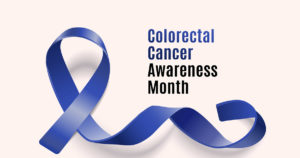March is Colorectal Cancer Awareness Month
February 23, 2021 President Clinton first designated March as Colorectal Cancer Awareness Month back in 2000. In the last twenty-one years, the annual campaign has been effective at promoting awareness and fundraising for colorectal cancer. The American Cancer Society (ACS) estimates there will be 104,270 new cases of colon cancer and 45,230 new cases of rectal cancer this year. Although colorectal cancer rates have steadily declined among individuals who are 65-years-old or older, they are slowly increasing (about 1% to 2% every year) for people younger than 50.
President Clinton first designated March as Colorectal Cancer Awareness Month back in 2000. In the last twenty-one years, the annual campaign has been effective at promoting awareness and fundraising for colorectal cancer. The American Cancer Society (ACS) estimates there will be 104,270 new cases of colon cancer and 45,230 new cases of rectal cancer this year. Although colorectal cancer rates have steadily declined among individuals who are 65-years-old or older, they are slowly increasing (about 1% to 2% every year) for people younger than 50.
Colorectal cancer is the third most commonly diagnosed cancer in American men and women (excluding skin cancers), and is a leading cause of cancer deaths. A big part of Colorectal Cancer Awareness Month is to promote the importance of early detection. When it is not found early, colorectal cancer can spread throughout the body. The earlier the cancer is found, the better the chances are for it being small and localized to one area. Medical professionals are voicing their concerns that preventive testing measures, like colorectal cancer screenings, have taken a hit in the wake of COVID-19. Getting preventive testing back on a safe track needs to be a priority: according to the ACS, regular colorectal cancer screening is the single most effective tool that we have in our fight against colorectal cancer.
When a colorectal cancer is found at an early stage, the five-year survival rate is about 90%. But when it is found later, the survival rate can be substantially lower. Currently, only 4 out of every 10 cases of colorectal cancer are found at an early, more treatable stage. Regular colorectal cancer screening is effective at preventing colorectal cancer because it enables doctors to identify problems before they turn into something more dangerous, like cancer. Polyps, for example, usually take 10 to 15 years to turn into cancer. During routine screening, a doctor can find a polyp and remove it before it becomes potentially life threatening.
Risk Factors for Colorectal Cancer
Current medical data indicates that 1 in 3 people who should receive colorectal cancer screenings have never been tested. Colorectal Cancer Awareness Month aims to bolster preventive testing efforts and awareness in order to decrease cancer incidence. The ACS reports that certain people are higher risk for colorectal cancer than others, such as individuals with:
- A personal history of colorectal cancer or certain types of polyps
- A family history of colorectal cancer
- A confirmed (or suspected) hereditary colorectal cancer syndrome, like Lynch syndrome or familial adenomatous polyposis (FAP)
- A person history of receiving radiation to the abdomen or pelvic area to treat an earlier cancer
- A personal history of inflammatory bowel disease
A doctor may recommend that someone who is higher risk be screened for colorectal cancer before he or she is 45-years-old. The ACS recommends that average risk individuals start regular screenings at age 45. The timeline for follow-up testing depends on the type of screening a patient has. For example, an average risk, healthy patient should have a colonoscopy every 10 years but should have a stool-based test, like a highly sensitive fecal immunochemical test (FIT), annually.
Symptoms
According to the Mayo Clinic, some signs and symptoms of colorectal cancer include:
- A persistent chance in bowel habits, including diarrhea, constipation, or a change in the consistency of your stool
- Persistent abdominal discomfort, such as cramps, gas or pain
- Rectal bleeding or blood in your stool
- A feeling that your bowel does not empty completely
- Unexplained weight loss
- Weakness or fatigue
Some people do not experience any signs and symptoms of colorectal cancer, which is why it is essential to stay on top of preventive screenings. If you are high risk for colorectal cancer or are an average risk individual who has not yet undergone testing and is at least 45-years-old, talk to your doctor about making an appointment.
Colorectal Cancer: Medical Negligence and Malpractice
Medical mistakes happen, but sometimes the mistakes are preventable and should never have happened in the first place. Medical malpractice occurs when a healthcare provider (like a doctor, nurse, aide, or other healthcare worker) is negligent in performing or omitting something that is considered standard medical practice. If a doctor misdiagnosed your colorectal cancer or was negligent during the scope of your treatment, an attorney at our firm can help. To learn more, contact a representative online now.
Philadelphia Medical Malpractice Lawyers at Galfand Berger, LLP Representing Injured Individuals Since 1947
Galfand Berger LLP has offices located in Philadelphia, Bethlehem, Reading and Lancaster, we serve clients throughout Pennsylvania and New Jersey. To schedule a consultation, call us at 800-222-8792 or complete our online contact form.
 Google Screened
Google Screened
